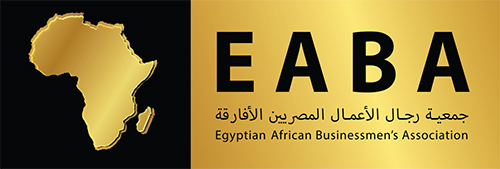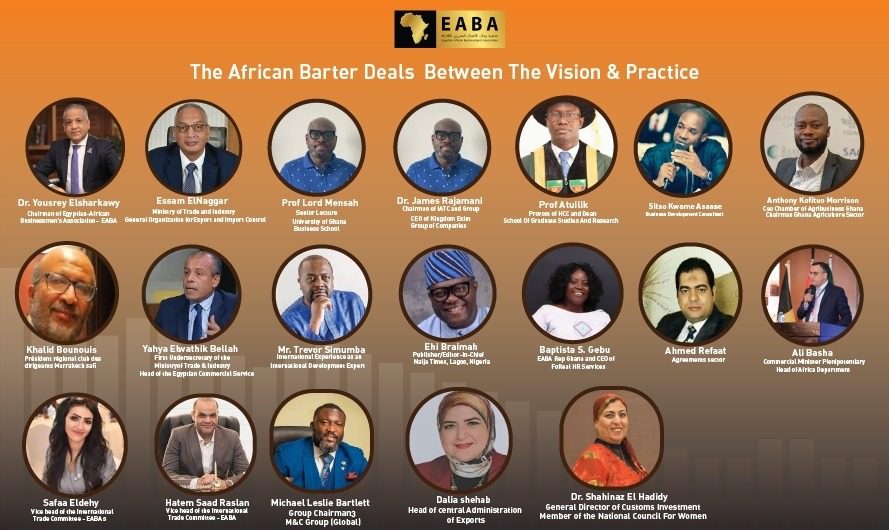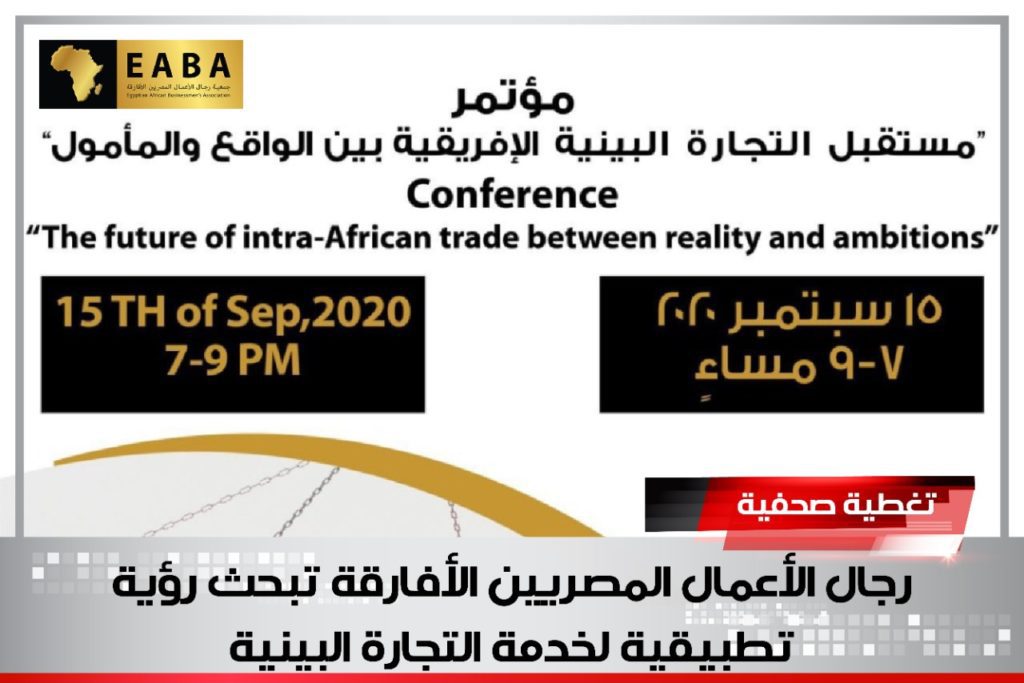The Egyptian-African Businessmen Association concluded its latest electronic conference, yesterday, Tuesday, titled “Equal African Deals between Vision and Application”, as the association has been holding a large series of virtual meetings that contain extensive discussions on various important economic issues, with the aim of serving the business community. Egyptian and African, and the advancement of the continent.
The webinar was chaired by Dr. Yousrey ElSharkawi, chairman of the Association, and the meeting was attended by a large number of experts in international and African economics and trade, including Dr. Hatem Saad Raslan, Chairman of the International Trade Committee of the Association, and Mr. Yahya Al-Wathiq Billah, Minister of Trade Plenipotentiary – Head of the Agency Commercial representation at the Egyptian Ministry of Trade and Industry, Mr. Essam El-Naggar, representative from the Ministry of Trade and Industry, the General Authority for Export and Import Control, and Mr. Ali Pasha, Minister of Trade Plenipotentiary – Director of the Africa Department at the Commercial Representation Authority at the Egyptian Ministry of Trade and Industry.
Also present at the symposium were Mr. Ahmed Refaat, from the Agreements Sector at the Ministry of Trade, Ms. Shahinaz Al-Hadidi, Director General of Customs Investment, and a member of the National Council for Women, and Ms. Dalia Shehab, Head of the Central Administration for Exports, Origin, Research and Technical Guidance. A large number of African experts, including: Mr. Trevor Simba, International Consultant Zambia, Prof. Lord Mensah, Lecturer, Business School, University of Ghana, Prof. Atwilik, Provost of HCC and Dean of Graduate School and Research, Mr. Michael Leslie Bartlett, Vanderpuye M&C (Global), Mr. Setsuo Kwame Asasi, Consultant Business Development, Mr. Ihi Braima, Editor-in-Chief, Naija Times, Nigeria, Mr. Anthony Kovito Morrison, CEO, Ghana Chamber of Agribusiness, and Mr. James Rajamani, Chairman of IATC and CEO of the Kingdom Exim Group of Companies.
At the beginning of the meeting, Dr. Yousry El-Sharkawi welcomed the attendees, describing the meeting as being of a heavy caliber, given the importance of the issue of equal deals, especially in light of the ambitious programs adopted by the political leadership in Egypt and the rest of the countries of the continent, stressing that this matter requires more efforts and attempts; So that we can implement equal deals in commercial dealings on the continent so that we can put Africa on the right path.
El-Sharkawi stressed the importance of conducting trade exchange operations between African countries with a system of equal deals, calling for the need to sign agreements through which Egyptian and African goods and commodities can be exchanged and bartered. He added that dealing with the African market has some difficulties, especially in banking transactions, indicating that resorting to the mechanism of Equivalent deals will be of great benefit with African markets.
Dr. Yousrey El-Sharkawi stressed the importance of holding many meetings on this subject. With the aim of reviewing the experts’ proposals regarding activating the equal deals system, as an important mechanism for strengthening and developing trade relations between Egypt and the rest of the continent.
For his part, Dr. Hatem Raslan, Head of the Association’s International Trade Committee, indicated that Egypt is a pioneer in equal deals, explaining that the system of equal deals is one of the commercial systems that Egypt used in the past to exchange goods for other goods, especially in the fifties and sixties, stressing that Dealing with this mechanism will eliminate many of the problems that the economic market suffers from, especially saving in hard currency.
Dr. Yehia Al-Wathiq Billah, Minister of Commerce – Head of the Commercial Representation Authority at the Egyptian Ministry of Trade and Industry, affirmed that the government is keen to adopt all mechanisms that contribute to developing and advancing trade between Egypt and African countries, noting that the equal deals mechanism is very important at the present time for For Egypt and many countries of the continent, due to the difficulty in providing the dollar factor in a number of African countries.
Mr. Ali Pasha, the delegated Minister of Commerce – Director of the Africa Department at the Commercial Representation Authority at the Egyptian Ministry of Trade and Industry, stressed that equal deals were the basis of trade for some countries, including Egypt, two or three decades ago, indicating that the government stopped using the equal deals system from the beginning The era of economic reform, and he added that most of the commercial deals in the Egyptian market are done through businessmen and not the government, as the commercial transactions conducted by the government itself have decreased, noting that the changes in the economic systems have provided a large space for the private sector; to work with this mechanism.
Regarding the possibility of returning to work with the system of equal deals, Mr. Ali Pasha indicated that the private sector may be more capable of implementing the proposal to work with equal deals that aim to encourage trade exchange, or to solve crises in the management of hard currency or foreign exchange.
Mr. Ahmed Refaat, from the Agreements Sector at the Ministry of Commerce, indicated that equal deals are not limited to the exchange of goods only, but also extend to the exchange of services between countries, stressing the importance of diversifying trade exchange between Egypt and African countries; To include manufactured goods with higher added value to achieve greater common benefits for the continent’s economy.
For her part, Dr. Dalia Shehab, Head of the Central Administration for Exports, Origin and Extension Research, reviewed the authority’s role in a number of points, stressing that the authority works to facilitate the work of exporters and importers, whether it is for importers in reducing the release time and for exporters in reducing procedures and contributing to analysis certificates, and stressed Provided that the Authority implements modern management and governance methods and follows the latest technologies. To make it easier for investors.
Mrs. Shahinaz Al-Hadidi, Director General of Customs Investment and a member of the National Council for Women, stressed that the lack of clarity in the mechanisms of dealing with the equal deals system represents a major obstacle for investors, stressing the need to increase cultural awareness of equal deals, noting the important role of this mechanism in advancing Egyptian trade relations – Africa, and reviewed the role of Egyptian customs in implementing the equal deals mechanism, stressing that customs contribute to developing the business environment in Egypt and making it conducive to investment.
Mr. Trevor Simba, the international consultant in Zambia, indicated that Egyptian products are eligible for export to Africa, stressing that Africa is one of the markets that has been neglected, and it must be invested in, especially since Egypt has a history with most of its countries, and added that the Egyptian market has tools that help it penetrate African market.
He noted that the African market is qualified to establish many investments in it with the aim of exporting to the Egyptian market, where fish farms can be established on rivers, and farms for raising livestock, in addition to the many raw materials that characterize the rest of the countries of the continent.
Professor Lord Mensah, a lecturer at the College of Business Administration at the University of Ghana, pointed out the need to focus on a timetable for implementing the equal deals mechanism, and to study the needs of the market and competitors on the African side, stressing that China has sent delegations to study the cultures and needs of African markets, and the countries of the continent must also take this. direction.
Mr. Michael Leslie Bartlett, from the Vanderpuye M&C (global) group, stressed that trade exchange between Egypt and African countries is important to implement during the current stage, after the signing of the free trade agreement between the three African blocs, stressing that this idea will eliminate the difficulty of obtaining currency or Foreign exchange needed to cover business transactions.
Mr. Anthony Covito Morrison, CEO of the Chamber of Agricultural Business in Ghana, indicated that intra-trade in the African continent represents about 6.8% of the volume of world trade, and the volume of trade exchange between Egypt and Africa is very low, and we must all work to develop trade and investment transactions. .
He added that everyone is rushing to work inside the continent now to exploit its potential. It enjoys the availability of lands, natural resources, and an active workforce, stressing that the past years witnessed a clear growth in trade and investment exchange between many countries of the continent.
Mr. James Rajamani, Chairman of the Board of Directors of IATC and CEO of the Kingdom Exim Group, stressed the growing importance of the African continent in the international arena, pointing out that there is an international competition to attract the countries of the continent, in light of the changing features of the international system and the emergence of global challenges and crises such as: food, energy. , climate change, and epidemics.
Stressing the growing international interest in the weight and importance of African countries in intertwining with these global issues and challenges; African countries have an opportunity to balance their relations between the international poles. In view of the economic resources and wealth it possesses, and its strategic geographical importance, adding that the countries of the continent have the right to exploit this giant economic wealth.
The meeting resulted in 15 recommendations that will be implemented during the next stage. At the end of the virtual symposium, Al-Sharqawi expressed his hope to expand the application of the equivalent deals system, noting that the obstacles of this system can be overcome by listening to investor proposals, and taking into account the recommendations of experts, which will reach In the end, we will achieve the economic goals of Egypt and the rest of the continent.



